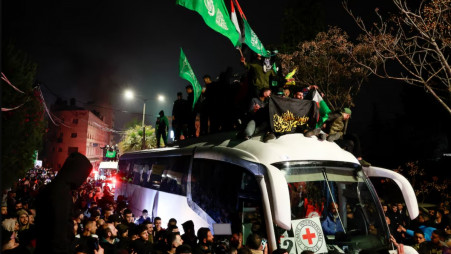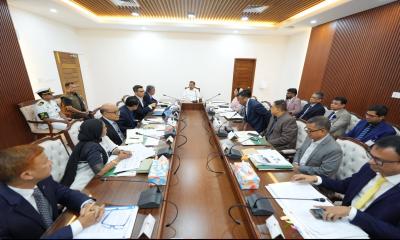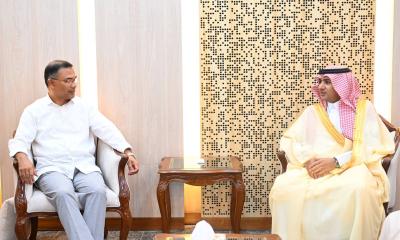Freedom carries a bittersweet feeling for Palestinians released from Israeli prisons.
When Dania Hanatsheh was freed this week from an Israeli jail and welcomed by jubilant crowds in Ramallah, it brought back uneasy memories for her.
After nearly five months of detention, it marked her second release as part of an agreement between Israel and Hamas for a pause in the Gaza conflict, reports AP.
While Hanatsheh was overjoyed to be free again, she expressed sadness about the ongoing destruction in Gaza and uncertainty about her future, with many in her community sharing her fears of future detentions.
“Palestinian families are ready for arrest at any time,” she explained.
“It feels helpless, like there’s nothing you can do to protect yourself.”
Hanatsheh was one of 90 women and girls freed by Israel in the first phase of the ceasefire deal.
The deal involves the release of nearly 2,000 Palestinian prisoners, halting fighting for six weeks, freeing 33 hostages from Gaza, and increasing aid to the region.
Some prisoners are held for minor acts like throwing stones, while others are convicted of killing Israelis.
Hanatsheh was initially arrested in November 2023, shortly after the war began, and released briefly during a ceasefire in exchange for hostages.
She was arrested again in August when Israeli forces raided her home with explosives.
Despite being detained twice, she was never told the reasons for her arrests.
Israel’s justice ministry claims she was detained for “supporting terror,” but she was neither charged nor given a trial and is not affiliated with any militant group.
Her experience is common among Palestinians, where nearly every family across Gaza, the West Bank, and east Jerusalem has a relative who has spent time in an Israeli jail.
The ongoing conflict has caused significant family trauma, with many children growing up without one or both parents.
Since the war began 15 months ago, the number of Palestinians in Israeli prisons has risen to over 10,000.
The Israeli practice of “administrative detention” allows authorities to imprison individuals based on secret evidence without charges or trials.
This has been a source of frustration for many, including Amjad Abu Asab, head of the Detainees’ Parents Committee in Jerusalem, who highlighted the lack of transparency in the process.
The terms of the ceasefire stipulate that the released prisoners cannot be re-arrested for the same charges or returned to jail to complete sentences for past offenses. No documents are signed upon release.
Conditions for prisoners deteriorated severely after the war in Gaza began. Israel’s then-national security minister, Itamar Ben-Gvir, vowed that prisons would no longer be “summer camps.”
Released prisoners reported inadequate food, medical care, and overcrowded conditions.
Prisoners, both male and female, have been subjected to beatings, pepper spray, and deprivation of family visits or even clean clothes.
One of the most prominent prisoners released was Khalida Jarrar, 62, a leader of the Popular Front for the Liberation of Palestine, a leftist faction involved in armed resistance.
Human Rights Watch condemned her repeated arrests as part of Israel’s unjust crackdown on non-violent political opposition.
While some families celebrated the release, others expressed concern that the ceasefire wouldn’t last long enough to see the return of their relatives.
Negotiations for a second phase of the ceasefire will aim to release all remaining hostages and secure long-term peace, but uncertainty remains.
For Yassar Saadat, the release of his mother, Abla Abdelrasoul, who had been in “administrative detention,” was a bittersweet moment.
His father, Ahmad Saadat, a high-profile leader of the Popular Front, remains imprisoned, and it’s uncertain whether he will be released.
The release of some prisoners convicted of killing Israelis has sparked controversy, particularly among families who have lost loved ones to such attacks.
Micah Avni, whose father was murdered by a Hamas member in 2015, expressed his belief that such prisoner exchanges might not lead to lasting peace.
Despite the controversy, some Palestinians see the prisoner exchanges as justified due to Israel’s arbitrary detention policies.
Others, like Amal Shujaeiah, focus on the personal toll of lost time with their families.
Shujaeiah, who spent over seven months in prison, was accused by Israel of participating in pro-Palestinian activities and hosting a podcast on the Gaza conflict. She expressed immense joy at being reunited with her family.
“Today I am with my family and loved ones. It’s an indescribable joy, a moment of freedom that helps you forget the sorrow,” Shujaeiah said.






-20260220065859.jpeg)
-20260219110716.webp)
-20260219054530.webp)




-20260222063838.webp)







-20260221022942.jpg)
-20260221022827.webp)














